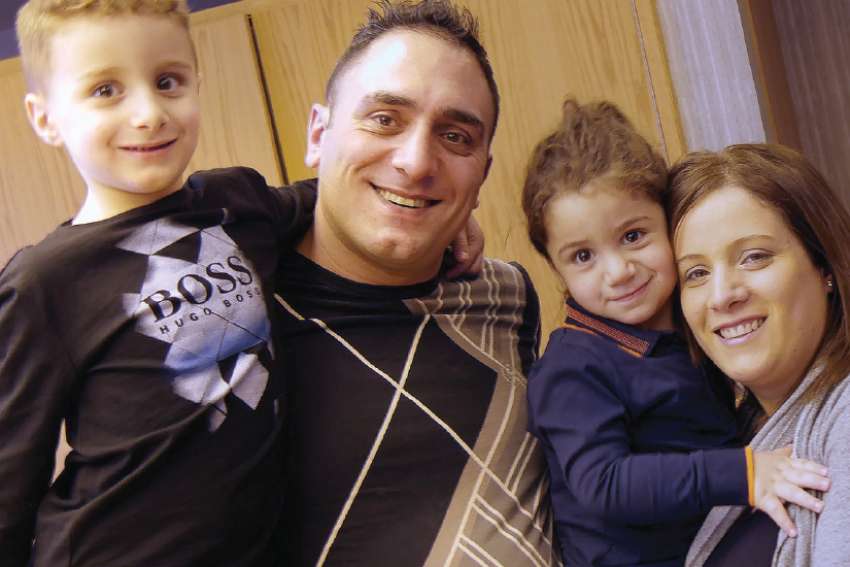That he can do all this, however, is a miracle, according to his parents Said and Dolly. Their son was not expected to survive a traumatic birth. They attribute his survival to the intervention of his namesake, St. Charbel Makhlouf, a 19th-century Lebanese monk famous for miracles.
“We were hoping for a miracle from God,” Said said in an interview. “Since he’s been born, we’ve had to tell the story of St. Charbel. Through that story now, we have our son.”
The Fadels are Lebanese and worship at Our Lady of Good Help, the Maronite Catholic parish in Edmonton.
Charbel Fadel was born Oct. 22, 2015. It was a difficult birth. Without oxygen for the first nine minutes of life, the baby was given only a four-per-cent chance of survival. He was put on life support.
“They said, ‘There’s nothing that we can do,’ ” Dolly recalled.
Dr. Anan Hanna, a family friend who teaches at the University of Alberta medical school, was asked to review Charbel’s medical records.
“From the beginning he came with no reflexes, almost dead,” she said.
As an act of faith, the parents hung a picture of St. Charbel by their son’s incubator and a rosary on the light next to him. After three-and-a-half weeks, young Charbel started to breathe on his own, and within a month he was well enough to go home.
However, doctors warned the Fadels that Charbel might have seizures or developmental disabilities. He didn’t cry for three weeks. Initially he was fed from a tube.
“There was no acknowledgment from him,” Said recalled. “His body wasn’t functioning properly. His brother would bring drums and play, but he wouldn’t hear anything.”
Dolly said: “He didn’t cry except if he was hungry. I was like, ‘God, you brought him into this world. Please don’t let him have a hard life.’ ”
Late one night during the 2015 Christmas holidays, alone in his basement, Said prayed for a miracle.
“I was just sitting there, praying, and telling the Lord ‘Give me the pain. My son is a baby. He doesn’t deserve to be in that state.’ It’s like I heard a voice come to me and he told me, ‘Grab my picture and put it on the top of your son’s head.’ ”
Said went into his own father’s room, grabbed a picture of St. Charbel, and placed it above the crib.
“I prayed a little bit on top of his head and then I went to our bedroom and I told my wife, ‘You know what? Everything is going to be OK. Someone came to me and told me to place the picture above his head and I did it.’”
The next morning Dolly was amazed to see her baby interacting with the picture.
“He was, all the time, looking to the picture. You could see his face smiling and he didn’t move his head from the picture. And every time you moved him, his eyes were on the picture.”
Charbel’s condition improved rapidly. The Fadels took him for medical tests, and all his vital signs indicated that he was a normal, healthy baby. Since then, Charbel’s checkups indicate that his walking, talking and medical and neurological development are progressing normally.
Hanna said the intercession of St. Charbel occurred twice: once when Charbel began to breathe on his own and the second when his memory, hearing and reflexes appeared to be normal.
Asked if he believes, as a medical professional, that a miracle occurred, Hanna is unequivocal.
“Definitely. In two stages. Nine minutes without enough oxygen? No way” he would survive. “Something unbelievable happened.”
The Fadels’ pastor, Fr. Joseph Salame, said St. Charbel is famous in Lebanon as an intercessor for the sick — with many miracles attributed to him — and he believes that’s what happened in this case.
“Every Lebanese house and Christian goes to visit the shrine because they have a strong belief in St. Charbel,” Salame said. “But the strong belief is that God is our healer through His saints.”
Charbel’s medical records and other documentation will be sent to Edmonton Archbishop Richard Smith, to the Fadels’ own Maronite bishop, and to St. Charbel Church and Shrine near Beirut, where all miracles attributed to the saint are recorded.
Skeptics may question what caused baby Charbel’s recovery, but the Fadels know in their hearts that a miracle occurred.
“We believe in St. Charbel,” Dolly said.
(Grandin Media)


